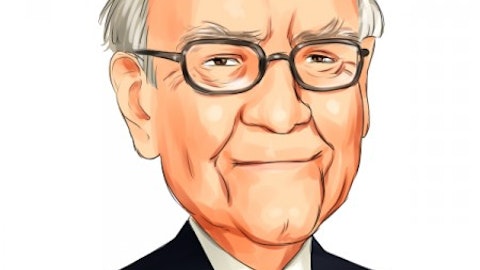Billionaire Warren Buffett is arguably the greatest investor of all time. Given his investing acumen and track record, millions of investors watch how Buffett and his investing lieutenants allocate Berkshire Hathaway’s capital every quarter. Any meaningful buy or sell could affect sentiment in the short term, and potentially cause other investors who respect Buffett to do the same. With that said, let’s analyze Buffett and his lieutenant’s capital allocation moves in the first quarter now that the latest 13F data for Berkshire Hathaway is out.
Our research has shown that hedge funds’ small-cap stock picks managed to beat the market by double digits annually between 1999 and 2016, but the margin of outperformance has been declining in recent years. Nevertheless, we were still able to identify in advance a select group of hedge fund holdings that outperformed the market by 32 percentage points since May 2014 through March 12, 2019 (see the details here). We were also able to identify in advance a select group of hedge fund holdings that underperformed the market by 10 percentage points annually between 2006 and 2017. Interestingly the margin of underperformance of these stocks has been increasing in recent years. Investors who are long the market and short these stocks would have returned more than 27% annually between 2015 and 2017. We have been tracking and sharing the list of these stocks since February 2017 in our quarterly newsletter.

Berkshire added 5.375 million shares of Delta Air Lines, Inc. (NYSE:DAL) in Q1, bringing the airline’s total holding in Berkshire Hathaway’s portfolio to 70.9 million shares at the end of March. Delta Airlines currently trades for a forward P/E of 7.6 and has risen 10.3% year to date. The stock is somewhat dependent on oil prices, which are still rather low, and the U.S. economy, which is strong. Analysts have an average price target of $66.4 per share.
Buffett likes his banks, and PNC Financial Services Group Inc. (NYSE:PNC) is no exception. Berkshire Hathaway inched up its position in PNC by 4% in the first quarter by adding 407,992 shares, bringing Buffett’s company’s total in PNC to 8.67 million shares, worth over $1 billion at the end of March. Many investors think U.S. banks will be relatively unaffected fundamentally from the U.S. China trade war, which is certainly good for PNC shareholders.
Buffett’s fund cut its holdings in Phillips 66 (NYSE:PSX) by more than half, selling 6.343 million shares in Q1. At the end of March, Berkshire Hathaway reported a position of 5.55 million shares, worth slightly over half a billion dollars at the time. Phillips 66 shares haven’t done well over the last four quarters, falling 26.2%. They trade for 8 times forward earnings estimates.
While Buffett may have added Delta, Berkshire went the other way with Southwest Airlines Co. (NYSE:LUV). Buffett’s fund trimmed its holdings in the low cost airline by 2%, selling 1.198 million shares, in Q1 to end March with a holding of 53.64 million shares. That position was still worth a cool $2.784 billion at the end of March. Like Delta, Southwest Airlines benefits from the strong economy, and would benefit in the long run if oil prices remain low. According to a recent study, Southwest Airlines leads all airlines in ‘brand intimacy’, which is potentially good for repeat customers. Analysts have an average price target of $59.53 per share.
Buffett’s biggest sell was in Wells Fargo & Company (NYSE:WFC), where his fund sold 16.965 million shares in Q1. Nevertheless, Wells Fargo is such a big component of the Berkshire Hathaway portfolio (accounting for around 10% of Buffett’s 13F equity porfolio) that Buffett’s company still reported owning 409.8 million shares at the end of March, worth $19.8 billion. Wells Fargo shares yield around 4% in terms of the annual dividend if share prices stay around the same level. Although Wells Fargo’s latest earnings report wasn’t as great as that of other banks, Buffett seems to be a long term shareholder, and the stock can potentially bounce back.
Disclosure:None





